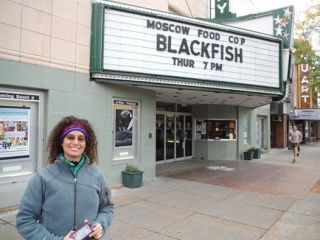Environment
Beyond Blackfish: Symposium Marks a Rapid Heroic Response
Cast, faculty and community link orca, salmon, conservation, captivity and more.
Posted October 27, 2014
Samantha Berg with Blackfish marquee In memory of L-120, the first and only calf born since 2012 to the endangered southern resident killer whales. The news of the calf’s loss came days after this symposium.

Samantha Berg with Blackfish marquee
In memory of L-120, the first and only calf born since 2012 to the endangered southern resident killer whales. The news of the calf’s loss came days after this symposium.
Since I started Mothering Nature, you might’ve noticed that I’ve focused a lot on whales; in particular, the story revealed by David Kirby’s Death at SeaWorld and the award-winning film Blackfish. The reason? My take on this gateway story is not occurring in isolation…rather it’s a near universal response of informed Americans to one corporation’s misuse of power, and now, its ongoing distortion of truth. We citizens, it seems, are getting more and more outraged and disgusted by what our laws have allowed corporations to do. Naomi Klein has even written a new, world-changing book, that D.R. Tucker at the Washington Monthly calls “one of the greatest works of nonfiction of all-time,” pinpointing the severe disruption of our natural systems by corporate, capitalist dysfunction. This Changes Everything: Capitalism versus the Climate spells out the end result—the unimaginable crisis of climate change—while at the same time, slinging a massive tsunami of solutions-based justice from this moment forward.
The Blackfish Effect, with its rapid response, is just one example of the thousands of uprisings around the world of the human spirit—and our hard-wired psychology—confronting a a suite of challenges that, in some ways, has never been faced. Climate change of this magnitude has all but erased life on earth before; the previous handful of mass extinctions proves it.
But there is a much simpler, much more human element embedded in this challenge, and it is the crux of response radiating like a beacon of possibility from The Blackfish Effect. It is human outrage and direct action fueled by profound empathic response (see Can The Whales Save Us? for more on this). It is why I’ve paid close attention to The Blackfish Effect, and why so many others have, too.
On October 16 & 17, 2014, a series of Blackfish-related events—attended by former SeaWorld trainers Samantha Berg, Dr. John Jett, and Dr. Jeffrey Ventre, of Voice of the Orcas—took place in Moscow, Idaho, and at the University of Idaho campus. It’s one example of something new to the world: a benchmark of the rapid surge of science-informed activism rising across fields, genres, institutions, and organizations in response to state-of-the-world information (in this case, for example, both the University of Idaho Department of Fish and Wildlife Sciences and The Moscow Food Co-op sponsored the event). It is an example of an emergent human social reaction to corporate dysfunction, and as such, it is part of a global, collaborative heroic response just now beginning to be documented by psychologists like Dr. Dana Klisanin. For that alone, it is worth watching.
And if you have seen Blackfish—or want to—all the better. This series of symposium events, now available online, will deepen, vitalize, and maybe even transform, your understanding of why Blackfish is making waves around the world. The Blackfish Effect is fast becoming a model for inciting human hope and action in an era when so much has to change so quickly.
The human spirit is responding to climate change, killer whale captivity, dying populations of wild whales, catastrophic declines in salmon, and all the other symptoms of corporate dysfunction we now face. In every way imaginable, our indominable, collaborative spirit is—if we take action—what will solve everything. As Margaret Mead has said, "It is the only thing that ever has."
Even though it’s over, you can take part in this Blackfish Symposium by following these simple steps:
1). Watch or read “All Hands on Deck,” my introduction to the film and symposium.
2). Watch Blackfish, available to stream on Netflix or rent it at your local movie rental shop.
3). Watch the Q&A following the film with former SeaWorld trainers and cast members, Dr. Jeff Ventre, Dr. John Jett, and Samantha Berg.
Part 1
Part 2
Part 3
4). Watch the Blackfish Panel Discussion and Workshop that took place at the University of Idaho School of Law Courtroom. Topics are listed as bullet points, below. Panelists included: Dr. Jeff Ventre, Dr. John Jett, and Samantha Berg, and University of Idaho faculty members Dr. Chris Caudill, Assistant Professor, Department of Fish and Wildlife Sciences and Fish Ecology Research Lab; Dr. Janet Rachlow, Professor, Department of Fish and Wildlife Sciences; Dr. Bert Baumgaertner, Assistant Professor, Philosophy Department; and Dr. Anna Banks, Associate Professor, Department of English. With special thanks to our facilitator Colette DePhelps, President of Board of the Moscow Food Co-op.
- Endangered orca, endangered salmon – the Idaho connection
- Role of captive wildlife in conservation
- The “Blackfish Effect:” Science informing activism
5). Watch the research seminar Captive Killer Whale Survival and Health Effects: Science Informing Activism by Dr. John Jett, Dr. Jeff Ventre, and Samantha Berg, former SeaWorld trainers and cast members.
6). Watch the local KLEW news story spotlighting the events.
7). Check out the list of books recommended in conjunction with these events.
Join the Mothering Nature conversation on Facebook and Twitter.
© Rachel Clark. Reprint with the specific permission of the author.




